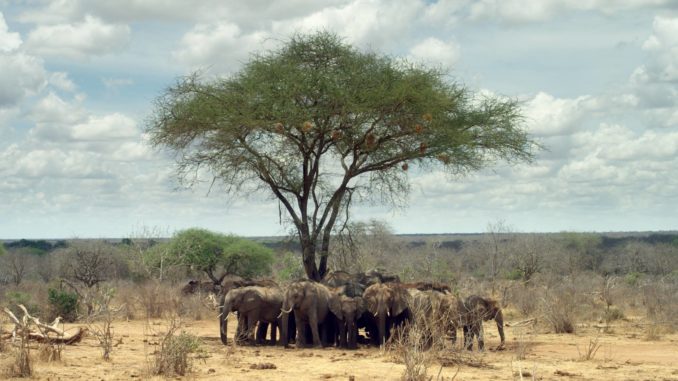
Writer, Director, and Cinematographer Adam McClelland creates a masterwork of a documentary film that chronicles the realities of elephant poaching in Africa and the work that the continents Keepers due in order to preserve their natural habitat. Everything from the breathtaking long shots of the landscape, to the close-up shots of the elephant juveniles crying for their mothers being taken down by a poachers arrow, is astonishing in this brutal take on such a silent topic in global politics. Africa is captured in all its natural and raw beauty by McClelland, especially the nation of Kenya where poaching is a huge problem that has decimated the natural landscape of its arid country. The director brilliantly juxtaposes shots of the elephants trying to live out their days in the wilderness with the altruism of the men in Keny seeking to alieve the poaching pandemic that has rocked their beautiful nation. Party cinema verite, part nature film, Keepers of the Wild takes more than a mere step in awakening the rest of the world to the grim realities of poaching in the African continent and this is a film that needs to be viewed intensely.Â
Nature In Place of Nurture
Without a single take on the familial dynamic of elephants, this film instead, focuses on human beings and their havoc on Kenya’s wildlife order. McClelland seems more determined to shift his attention to the outcomes of poaching rather than provide a sociological stance on the economies of Africa. As also an editor on the project, McClelland never shies away from crosscutting to elevate the tension of this pandemic, and his use of rhymic continuity is spot on. The entirety of the film’s diegesis is on full display right from the opening establishing shot of Kenya, and the Keepers place within this world is fully established with each interview. The documentary director’s choice of pivoting his camera from the exteriors of the Kenyan countryside to the truth of cleaning up an elephants wound from a poacher symbolizes the realities of the animal’s plight in a way that few documentaries can achieve. There is not a single part of this documentary that felt tacked on or sublimated, and the entirety of the film is brutally honest to its poignancy. McClelland’s use of editing, camera work, and musical composition is a tour de force that rarely shies away from the awful elements of elephant poaching. Rather than seeking to soften the blow that comes with extinction, Keepers of the Wild forces the viewer to stare at this international travesty that affects all who seek to make planet earth a better place for future generations.
Everything We Need To Know About a Subject
In the end, Keepers of the Wild is a masterful use of the documentary genre that rarely shies away from a serious subject matter. As a work of art, the long shots juxtaposed with the close-up interviews of Kenya’s men who work to preserve the lives of the unprotected elephants is both heartful and riveting. Such contrasting images of an elephant named Yatta who starts out as a wounded juvenile grows into a maternal coupling in the wild due to the hard work of Keny’s men of the Keepers are the very same images that give this documentary the epic scope it so aspires to achieve. One simply cannot be angered about how poachers manipulate these elephants just for the glitter of gold they will receive from their tusks. Horrible truly, and McClelland imbues the severity of this crisis to a global platform. Kenya merely serves as the bedrock for this crisis, and the rest of the film elevates it to higher levels of an international travesty. The editing, combined with the camera work of the filmmaker rarely shies away from the realities of this grotesque practice, and as a whole, this documentary is everything one wants from a work of realism.Â
The Verdict
By far, Keepers of the Wild is one of the most powerful films displayed at this year’s Tribeca Film Festival. Rather than focusing on avant-garde cinematic techniques, nonsensical plots, and over the top acting, this documentary uses the realities of Africa’s plight to strike at the heart of this situation in ways few other films can achieve. Kenya merely serves as the template, the base for which this film shakes the viewer into witnessing the brutalities of the poaching industry. The soundtrack is natural and sparse, rarely distracting the audience from the images on the screen. Shots of elephants having bullet holes, the Keeper men removing poisoned arrows from a mother looking to simply feed her young, poison being drained from the wildlife’s tusks, all are marks of a what a naturalist documentarian should be doing to illuminate a subject matter. Nothing about this film felt tacked on, everything flowed evenly with the rhythms of the editing. Gone are the shot/reverse shot stock editing of popular motion films and instead, audiences are witness to a series of long takes and gut-wrenching close-ups. All this combined adds gravitas to this film and has helped to raise the bar on what a documentary work can do to the human psyche. Those staunch long shots of a mother elephant being taken away from her heard to die simply for the seller’s value of her tusks is something that never leaves the viewer and the director makes no attempt to soften the blow. This a film that is timeless, not because of its high production values, but because it sheds light on a subject so harrowingly by its majestic look at Kenya and Africa as a whole. Hands down one of the most poignant films of this year’s film festival, and a work of art that does not hold back from the realities of life on a continent so plagued by the outcomes of its sociological and economic poverty.Â


Leave a Reply